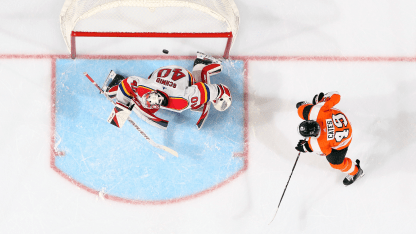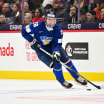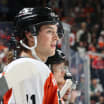The Flyers went up against a New Jersey Devils team on Saturday that was averaging the second-most shots per game in the league headed into the contest (36.1) and held them to four first period shots and just nine total shot attempts.
Flyers taking strides in structure as growing continues
Despite a tough stretch, Flyers Head Coach John Tortorella is seeing a more structured game progress

By
Brian Smith
philadelphiaflyers.com
But for as well as the Devils have played this season, they have been slow starters, with their first-period performances generally being the least of the three. So the more impressive thing was that the Flyers then held the Devils to just eight shots on goal in the second period, a frame where the Devils have been lights-out this season.
"People will say well Jersey was flat, I heard that comment," head coach John Tortorella said Monday ahead of the Colorado game. "Well, we had a little bit to do with that, as far as them being flat or how they played. I want our guys to feel good about that."
The buildup that Tortorella and his staff are undertaking with the Flyers focuses on an effective defensive system where the team works as a five-man unit to prevent high-danger chances. First the team needed to learn how to execute it; from there, it becomes a matter of consistency. A hockey game sometimes can proceed like a prize fight where one team has momentum until the horn sounds and then suddenly, after the intermission, the other team takes control the next period. The Flyers had played good periods this season, but bridging that gap from one period to another hadn't necessarily been easy to do.
However, they were able to do it on Saturday. It almost felt inevitable after that first period that New Jersey would come out flying in the second, but the Flyers were able to continue locking them down. Their first goal came on their first real scoring chance of the game. They had another shortly afterwards that Hart turned away, but after that there was hardly anything until the mishap behind the Flyers' net in the third period.
"We were assertive with our decision-making," said Flyers defenseman Ivan Provorov." We skated fast, pressuring the puck, pressuring the players, and it helped us a lot to control the game for the most part. Obviously, there's a few mistakes that happened that led to goals."
That will be something to watch for with the Flyers this week, is how they are able to continue executing their defensive structure. The New Jersey game marked the third time in the span of four contests that the Flyers generally played an excellent defensive game. That's a sign of consistency settling in, and the ability to maintain it across multiple periods against the Devils is a further positive sign.
"Three out of the last four games, I've seen tremendous strides in our structure," Tortorella said. "Does it equate to wins? No. You want to get those, but I need to coach the team as far as how we're playing.
"The thing that's encouraging to me, I just think we're taking steps in the right direction in some of the more difficult parts of the game, playing away from the puck. I think we're going in the right direction there."
The only problem is, as Tortorella said, is that it hasn't translated to wins - at least not yet. And of course, the Flyers want to win. After the New Jersey game, the frustration was palpable. But Tortorella doesn't want that frustration to affect the way his team's playing.
"I love the intensity and fire and the hate to lose, but we've just got to make sure we stay on that right line of not getting too frustrated and we forget how to go about our business," he said. "I felt bad for our team after that game, because I thought they did everything they were supposed to do. I want our guys to feel good about that."
With this foundation in place, the Flyers can start looking at improving their offense, and there were signs of that as well in the third period of Saturday's game. Lukas Sedlak's third-period goal came in a situation the Flyers had been working on the day before, putting multiple players in front of the net to make the goaltender's life difficult, and Sedlak and Scott Laughton successfully created a layered screen that let Travis Sanheim's point shot get through on a Sedlak deflection. And while they didn't get anything else past Akira Schmid, there was a deliberate effort to bring forwards across the slot to make moving re-directions, which resulted in a couple of rebounds nearly being tipped home, another thing that was worked on Friday.
"The fun part of the game, scoring goals, that's where we have some struggles," Tortorella said. "[Travis Konecny] seems to be getting going, James [van Riemsdyk] is pretty close maybe. Maybe our power play scores another goal next game and it just starts gaining some confidence there. Confidence is hard to teach offensively, so we're going to lock in on the [defensive] part. That's what's encouraging to me - that's the hardest part, that I think we're improving at."
So those footers that Tortorella referred to earlier in the week are getting a little stronger. There is still a long way to go, however. The first two New Jersey goals were caused by Flyer mishaps, but in both cases those mishaps were partially caused by a relentless Devils forecheck that forced Philadelphia into making mistakes. On the third goal, Ivan Provorov fell down while trying to defend Jack Hughes, and the Flyers weren't able to rotate back to slow him down. Learning to effectively deal with both of those kind of things - an aggressive forecheck and a game-seizing player - will be on the Flyers' to-do list at some point along the road.


















